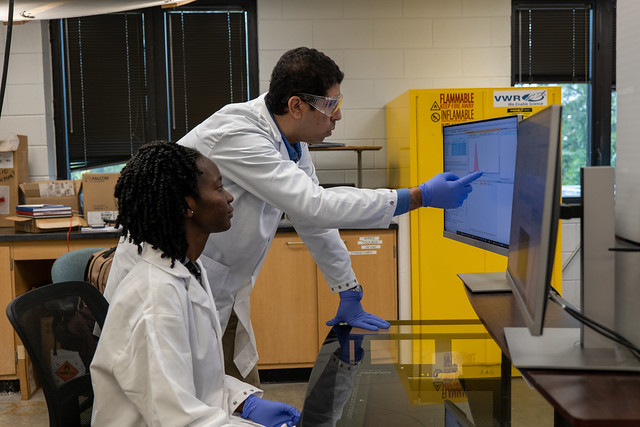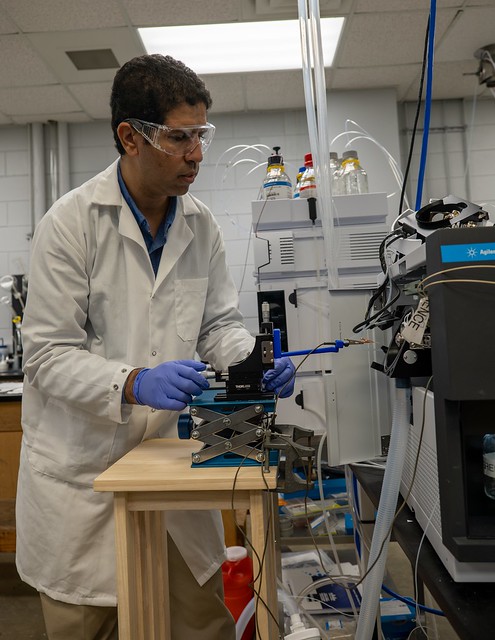Auburn University chemist to use new technology in better detection of health, security threats
Article body
Ahmed Hamid, an assistant professor in Auburn University’s Department of Chemistry and Biochemistry, is focused on research that one day could lead to greater detection of Alzheimer’s disease, quicker analysis of bacterial infections and enhanced security checkpoints at airports.
Funded by multiple grants, including a $1,780,527 Maximizing Investigators’ Research Award, or MIRA, from the prestigious National Institutes of Health, or NIH, Hamid is working on three separate projects that have the potential to enhance life through research conducted at Auburn. The projects are supported through the NIH, Auburn’s Research Support Program, or RSP, award with Auburn’s Harrison College of Pharmacy and the Department of Homeland Security with Auburn’s College of Veterinary Medicine.
“An especially striking feature of Dr. Hamid’s research program is the breadth of its application to pressing national and global concerns in human health and security,” said Doug Goodwin, chair of the Department of Chemistry and Biochemistry in the College of Sciences and Mathematics. “His development of groundbreaking methodology and instrumentation in ion-mobility separations and mass spectrometry has the potential to spark advances across a wide array of fields.”
The goals of research in the Hamid Lab directly impacts security detection, human health and even crops. Through creating new mobile mass spectrometry devices, the ability to detect threats at the actual site instead of sending samples back to a laboratory can greatly reduce the time to identify and detect infectious diseases. His work also can be directly applied in the agriculture industry to identify the presence of possible pesticide residues on fruits and vegetables.
First, through the funding of the NIH award for early-stage investigators, Hamid is the primary investigator who will concentrate on key research areas over the next five years that will focus on inventing a new mass mobile spectrometer to go to the physical point of care or place where a threat could be detected.
He also will analyze the discrimination of bacteria in its native environment.
“These tests could help people be prescribed less medications, which can directly reduce the overuse of antibiotics in today’s society,” said Hamid, who earned his doctorate from Virginia Commonwealth University. “Using ion mobility mass spectrometry techniques and methods, we can reduce the window from 48 hours to only four hours to determine what the infecting pathogens a patient has.”
He also will help create new methods to diagnose Alzheimer’s disease.
The work supports the NIH’s mission of the National Institute of General Medical Sciences, or NIGMS.
His work also can impact people at airports around the world. Two major issues interfere with the current technology with security. Items can be easily missed due to limited sensitivity, and false readings can occur due to limited specificity. Both issues can increase wait times and increase the overall risk for travelers.
However, Hamid is re-imaging the technology that would enhance keeping lives safe and reducing time through creating a new vision of a mass spectrometer.
“Instead of a long drift tube, if the ions were moving around in a serpentine path, it would reduce the total space needed for the actual instruments,” said Hamid, who earned his Bachelor of Science from Alexandria University in Egypt. “Visualize a standard 18-inch laptop. If that laptop was converted into a serpentine path, it would yield 13.5 meters of space for the ions leading to very high sensitivity and specificity!”
Another method is to use an ion mobility spectrometer that can be taken on-site instead of sending items off to a lab.
“The operator can apply different conditions and scan an entire range with results immediately,” Hamid said.
Hamid is working to determine less invasive ways to detect Alzheimer’s disease in patients. By employing tests that use blood instead of spinal fluid, medical professionals can access a greater population and provide more information for health care.
Through Auburn’s RSP award with the Harrison College of Pharmacy, he is collaborating to test treatment drugs for patients diagnosed with Alzheimer’s.
Hamid also is part of a team working with a $24 million award from the Department of Homeland Security Science and Technology Directorate.
This award is the largest research contract in Auburn’s history.
“I am excited to be part of the Detection Canine Sciences, Innovation, Technology and Education, or DCSITE, project,” said Hamid. “Through developing a device with high resolution and high sensitivity, this program will reduce threats and reduce wait times going through security checkpoints.”
He will be focusing on developing technology with faculty from the Department of Chemistry and Biochemistry, Department of Mathematics and Statistics and Department of Physics.
Auburn’s College of Veterinary Medicine’s Canine Performances Sciences program is known around the world for its work to help detect threats through man’s best friend’s olfactory senses.
Hamid will be using analytical chemistry to study the targets of detections that directly include explosives, bacteria and viruses.
“Our goal is to develop our very own portable device over the next few years,” he said.
The information also will be used to help enhance the student experience at Auburn.
“Chris Easley and I will collaborate to develop a new course as part of this award,” he added. “It will allow us to introduce students to the real-world analytical instrumentation and methods used in forensic applications.”
Hamid always has had a passion for life-enhancing research.
As a postdoctoral scientist at Purdue University from 2012-14, he would travel to a major hospital to collect samples of tissue from patients with prostate cancer already scheduled for procedures in the operating room. As part of a dynamic team with R. Graham Cooks at Purdue, he helped collect data for a project with the Mayo Clinic that could impact how tumors are treated. Cooks received the 36th annual Kosolapoff Award from Auburn’s Department of Chemistry and Biochemistry and recently gave a talk about his research.
Related Media
Media interested in this story can contact Communications Director Preston Sparks at (334) 844-9999 or preston.sparks@auburn.edu.
Auburn University is a nationally ranked land grant institution recognized for its commitment to world-class scholarship, interdisciplinary research with an elite, top-tier Carnegie R1 classification, life-changing outreach with Carnegie’s Community Engagement designation and an undergraduate education experience second to none. Auburn is home to more than 30,000 students, and its faculty and research partners collaborate to develop and deliver meaningful scholarship, science and technology-based advancements that meet pressing regional, national and global needs. Auburn’s commitment to active student engagement, professional success and public/private partnership drives a growing reputation for outreach and extension that delivers broad economic, health and societal impact.







